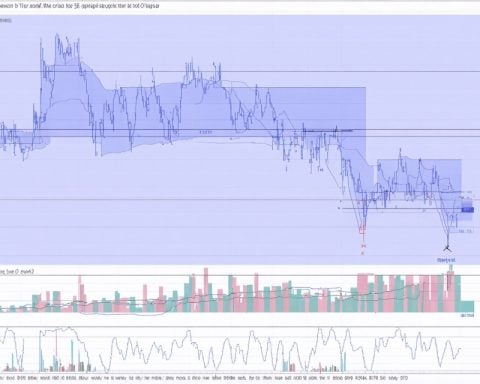Nvidia’s third-quarter performance has set a new benchmark, displaying a significant surge in revenue driven by the soaring demand for its AI chips. While their stock experienced a slight dip in after-hours trading, the company’s overall outlook remains highly optimistic.
Record-Breaking Financial Performance
For the quarter ending October 27, Nvidia announced an astonishing revenue of $35.08 billion, showcasing a striking 94% increase compared to last year’s $18.12 billion. The company’s net income more than doubled, reaching $19.31 billion, and surpassed Wall Street’s earnings predictions with an adjusted earnings per share of 81 cents.
Investor Sentiment and Future Growth
Despite these impressive figures, investor sentiment reflected caution, with Nvidia’s stock falling by 3% post-trading. This hesitance could be attributed to what some analysts view as conservative future projections, although the long-term demand for AI technology remains robust.
The stock’s dramatic 195% rise this year underscores Nvidia’s crucial influence in advancing AI technology. Projections for fourth-quarter revenue stand at $37.5 billion, slightly better than market analysts’ forecasts.
AI Expansion and Chip Production Challenges
Data center revenue soared 112%, attributed to Nvidia’s Hopper computing platform, which aids in high-level AI applications. However, Nvidia is facing supply chain challenges with the production of its next-generation Blackwell AI chips, pivotal for upcoming AI advancements.
Colette Kress, Nvidia’s CFO, highlighted expectations of potential production delays for Blackwell, though demand is anticipated to outpace supply in the short term. CEO Jensen Huang affirmed ongoing efforts to meet robust market demand, emphasizing Nvidia’s commitment to AI’s transformative impact globally.
The AI Revolution: How Nvidia’s Breakthrough Impacts Global Economy and Society
Nvidia’s Next Big Move: Beyond Revenue Figures
While Nvidia’s stellar financial performance is making headlines, the implications of their technological advances are extending far beyond Wall Street. The leap in AI chip development signifies a monumental shift across various sectors, impacting everything from healthcare to automotive industries.
The Ripple Effect on Healthcare
Nvidia’s advancements in AI have the potential to revolutionize the healthcare sector. The application of AI chips in medical imaging and data analysis enables faster diagnostics, personalized treatment plans, and improved patient outcomes. Hospitals utilizing AI technology are witnessing shorted patient wait times and enhanced diagnostic accuracy. However, the integration of AI also raises ethical questions about data privacy and the extent of AI involvement in patient care. As AI continues to grow, will healthcare systems be fully prepared for a shift towards technology-driven solutions?
Automotive Innovation on the Horizon
In the automotive industry, Nvidia’s AI chips are integral to the development of autonomous vehicles. These chips facilitate real-time data processing for critical functions such as navigation, safety, and efficiency. The adoption of AI in vehicles promises to reduce accidents and streamline transportation. On the other hand, these technological advances could disrupt traditional driver-based roles and raise security concerns related to AI systems in vehicles. Are the roads ready for an AI-driven future, and how will it transform everyday commutes?
Impact on Global Workforce and Economy
Nvidia’s AI revolution inevitably influences the global workforce and economic landscape. The demand for AI expertise has surged, prompting educational institutions to adapt curriculums to prepare the next generation of tech professionals. Companies are investing in AI solutions, leading to job creation in new tech sectors. Yet, this shift may also render certain jobs obsolete, causing economic uncertainty for workforces unprepared for rapid technological changes.
Countries investing heavily in AI technology are anticipated to gain significant advantages, enhancing their competitive edge in the global market. For instance, nations prioritizing AI infrastructure may experience accelerated economic growth, while those lagging behind risk economic stagnation.
Ethical and Environmental Dilemmas
As industries scramble to embrace AI, ethical dilemmas surrounding AI deployment become increasingly significant. Decision-making processes, data bias, and the potential for AI misuse are raising concerns that need addressing through robust policies and regulations. Moreover, the environmental toll of producing AI chips must not be overlooked. The energy-intensive manufacturing process and electronic waste contribute to ecological threats. Is the AI industry taking adequate measures to balance innovation with sustainability?
Links to Explore Further
– nvidia.com
– forbes.com
– reuters.com
As we stand on the brink of an AI-driven era, it remains crucial to evaluate the broader societal impacts. These advancements present a dual narrative — one of incredible opportunity but also of profound caution. The AI landscape not only calls for continued innovation but also for ethical stewardship and strategic foresight.























